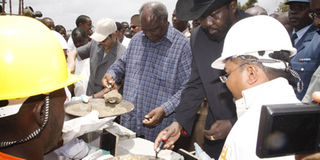Kenya is region’s hub for investments

March 2012: Kenya's President Kibaki is joined by Salvar Kiir of South Sudan and Ethipia's Meles Zinawi to lay foundation stones for the new Lamu Port Headquarters as part of the LAPSSET Corridor project in Lamu County. Kenya’s strategic location has been its core selling point to investors. PHOTO/FILE
What you need to know:
- As the main gateway to the over 150 million consumers in the East African Community, Kenya’s infrastructural development in ICT and roads, conducive business regulatory reforms and a surplus of adequately skilled human resource has made her an investors’ magnet in the region.
- The business environment has been made friendly to investors to the extent of offering free land for development to lure them.
Kenya’s strategic location as a launch pad to eastern and central African markets has been its core selling point to investors, who have chosen it as their centre of regional operations.
As the main gateway to the over 150 million consumers in the East African Community, Kenya’s infrastructural development in ICT and roads, conducive business regulatory reforms and a surplus of adequately skilled human resource has made her an investors’ magnet in the region.
Despite Ethiopia having robust air travel to major destinations in the world, being landlocked gives Kenya an edge, given that Jomo Kenyatta International Airport is also a transport hub to major destinations around the world, in addition to the coastal ports.
Kenya is a member of the World Trade Organisation, so its exports are able to reach 90 per cent world markets. This makes it attractive to would be investors, who also enjoy the other trade treaties signed by the country.
Limited government control over the market in Kenya compared to her most neighbours, coupled with a well-organised private sector, pits the country as the region’s investors’ paradise.
The business environment has been made friendly to investors to the extent of offering free land for development to lure them.
Among the private sector players in the country include, the Kenya Private Sector Alliance (KEPSA), Federation of Kenya Employers (FKE) and The Kenya Association of Manufacturers (KAM).
These players have assisted in the provision of an attractive economic environment, which encourages foreign investors.
As an icing on the cake for investors, Kenya is a signatory to several tax treaties and investment promotion, as well as protection agreements to allow its exports to enjoy preferential access to world markets.
These conditions have, however, made some local manufactures worried.
They complain that some international manufacturers establish warehouses locally for their semi-finished goods, taking advantage to access the East African Community zone and creating unhealthy competition.
Kenya has also developed a blue-print for the development of Special Economic Zones and Industrial Parks, Industrial Clusters, promotion of small and medium scale manufacturing firms, development of niche products, and commercialisation of research and development results.
Emerging economy
As an emerging economy, Kenyan investment opportunities are vast, providing room for both foreign direct investors and joint-ventures by foreign with local investors in almost all sectors of the economy.
The rise of the Kenyan middle class has seen a demand for affordable housing.
The demand has brought about the construction of many residential estates and commercial buildings, such as shopping malls.
This housing boom is also enabling some to invest in construction materials, which are in demand.
Oil pipeline
Big investors have also been attracted by the opportunities lined up in the multi-billion dollar Lamu Port-Southern Sudan-Ethiopia Transport (Lapsset) mega project, where mouth-watering opportunities are expected from construction of new roads, power generation plants to construction of airports.
The Lapsset project will see a road and railway network developed, an oil pipeline network from South Sudan to Lamu put down and airports constructed in Lamu, Isiolo and Lokichogio resort cities.
The railway network will run from Lamu to Isiolo from where one line will branch to Ethiopia and another one to South Sudan.
The other big project set to be rolled out is Konza ICT Park, 60 kilometres from Nairobi.
According to its secretariat, it will begin with a 400-acre with 1.5 million square meters of initial real estate development. That will be the first phase.
It will include the development of $750 million of on-site infrastructure and $310 million of off-site infrastructure.
If all go as planned, phase 1 is expected to attract 30,000 residents, 7,500 knowledge workers, and 16,700 total workers.
Other investment opportunities are in the eco-tourism facilities in forest reserves in eco-lodges, tree houses, campsites and canopy walkways.
Untapped potential
Despite Kenya having an advantaged combination of tourist attractions, most of the potential is still untapped.
British billionaire, sir Richard Branson, is one of the high profile investors who recently opened his luxury tented camp in Maasai Mara “Mahali Mzuri”.
The Safari camp is operated by Virgin Limited Edition, which is part of Branson’s collection of ‘stunning retreats’ of Virgin Hotels Group.


